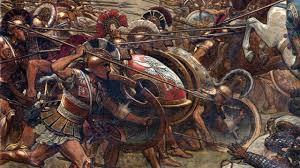Today I am writing a post suggested by and for my transgender granddaughter
Sam, who is mentioned often in my diary posts, she has learnt a bit about these
soldiers, I think at school, abut I am not 100% sure about that.
Anyway, the subject is The Sacred Band of Thebes.
The Sacred Band of Thebes was an elite heavy infantry of select
soldiers, allegedly consisting of 150 pairs of male couples which formed the
elite force of the Theban army in the 4th century BC, ending Spartan
domination. Its predominance began with its crucial role in the Battle of
Leuctra in 371 BC.
They were formed under the leadership of Gorgidas but first ac
hieved fame under the general Pelopidas. They remained invincible from 378-338 BCE when the entire troop fell together at the Battle of Chaeronea.
The military unit is first mentioned in 324 BCE in a speech, but
their full story wasn’t known to much later.
The Sacred Band were deployed early in the Boeotian War in 378
BCE under Gorgidas but became famous for their participation in the Battle
of Leuctra in 371 BCE. They remained undefeated until the decisive battle of
Chaeronea in 338 BCE when the Macedonians under Philip II and his son Alexander
the Great crushed the combined forces of Thebes and Athens.
The Sacred Band fell together as a single unit and, according to
Plutarch, were mourned by Philip II of Macedon himself as valiant warriors.
They would later became legendary figures exemplifying courage and military
strength.
The city of Thebes, where this band had been founded in 378 BCE was
particularly unique in how it regarded the love, between men. A young Plato is
thought to have said “the rule has been laid down straightforwardly that it
is right to gratify (male) lovers, and no one, young or old, would say that it
is wrong."
Of course, it was not uncommon for male-male encounters to be
pursued by ancient Greek soldiers, demonstrated through the institutionalised
practices of homoeroticism in Spartan militia and the cities of Crete.
The very act of homoeroticism was thoroughly incorporated into
the educational systems of the Greek world. It was a means to lead a boy into
adulthood, and by the Classical period, it extended into higher culture: “from
the military to athletic games, from philosophy to historiography.”
But why would Thebes want to specifically create an elite unit
of bonded male lovers, if homoeroticism was already part-and-parcel of ancient
Greece’s cultural fabric?
According to Plato’s philosophical thought, lover-soldiers would
inspire the courage and bravery needed on the battlefield. Plato tells us that:
The last person a lover could bear to be seen by,
when leaving his place in the battleline or abandoning his weapons, is his
boyfriend; instead, he’d prefer to die many times. As for abandoning his
boyfriend or failing to help him in danger – no one is such a coward that he
could not be inspired into courage by love and made the equal of someone who’s
naturally very brave. — The Symposium, 179a’
It is said that such was the powerful display of love that it
brought the great king to tears. So, to mark the burial site, a marble lion was
erected in honour of the fallen, acting as a “symbol of their courage.”
The Lion of Chaeronea is still standing. It's a funerary
monument erected in honour of the Theban Sacred Band, who died in the Battle of
Chaeronea in 338 BC. The monument was rediscovered in 1818 and later
restored, and it remains a prominent landmark near the battle site.
This once-famous troop of heroes is often passed over in
discussions of Greek history possibly because they were gay and the concept of
a victorious unit of gay warriors is at odds with the prevalent homophobia of
the present day.
As LGBTQ+ activism makes more progress in educating people,
however, the Sacred Band of Thebes is again receiving the kind of recognition
they deserve.









Never heard of this group, but I can see where they might have thought it would be a good idea at the time. They would protect each other, for sure. Very interesting. :)
ReplyDeleteI also had never heard of them and found it interesting
DeleteInteresting read, Jo-Anne and never heard of them. Long time ago indeed.
ReplyDeleteYes it was a long time ago
DeleteThis is the first I've heard of them, Jo-Anne, but knowing a bit about ancient Greek culture, it doesn't surprise me. Thanks for the info!
ReplyDeleteI was surprised when Sam asked me to do a post about them and finding out how long ago this happened
Delete